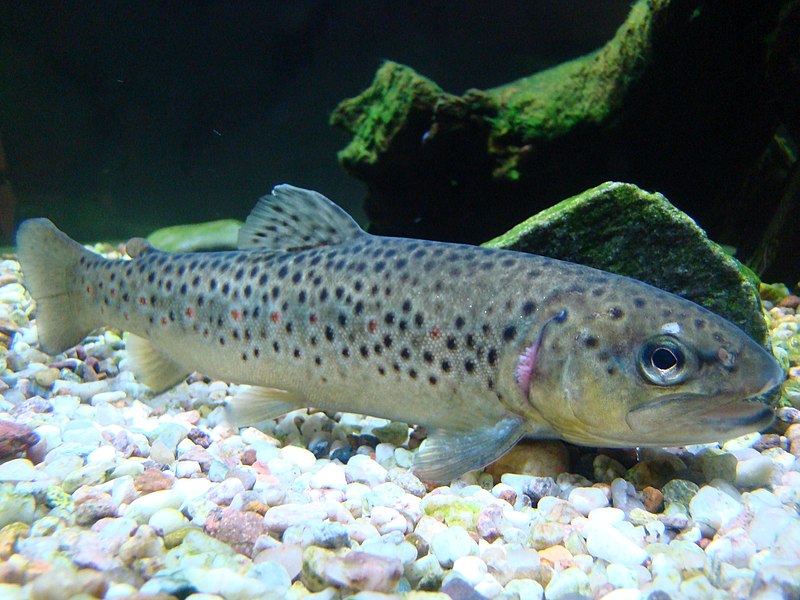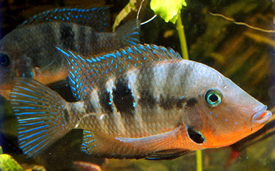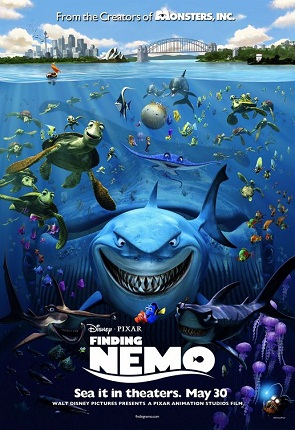
Aquarium Fish with Personality
Aquarists learn early-on that individual fish react very quickly to changes in their environment, and that not all do so in the same manner. Even the universal tendency of aquarium fishes to move towards the glass in anticipation of food when someone passes by is not usually shared by every tank inhabitant (this is actually a quite interesting bit of learned behavior – after all, fishes that rushed out to “greet” large beasts would not last long in the wild!).
Many folks find the various Cichlids to be among the most “personable” fishes, and my own experience supports this. Observing several breeding pairs of Firemouth and Convict Cichlids convinced me that different personalities were clearly being exhibited…a disturbance that would send one male into hiding would spur another to attack; a certain female might be easily distracted from her maternal duties, while no amount of food could temp another to stray far from the fry, and so on.
Native fishes that I have collected were even more individualistic, especially as regards their adjustment to captive habitats and new foods…Pumpkinseed Sunfishes in particular constantly surprised me with their unique reactions and behaviors.
The Survival Value of a Personality
 In a study recently published (December, 2010) in Sweden, researchers tested the reactions of wild-caught Brown Trout to novel objects and to changes in their environments. Individual fishes of the same age and sex exhibited widely varying behaviors in each situation – the same stimulus could incite different degrees of aggression, exploration or avoidance behavior.
In a study recently published (December, 2010) in Sweden, researchers tested the reactions of wild-caught Brown Trout to novel objects and to changes in their environments. Individual fishes of the same age and sex exhibited widely varying behaviors in each situation – the same stimulus could incite different degrees of aggression, exploration or avoidance behavior.
The trout were also marked and released back into the wild, and studied there. In most cases, individuals exhibiting “shy” behavior in the lab grew more quickly (in the wild) than did bolder fish. The researchers believe that bold fish might fare well in bare, indoor aquariums because they would be first on the scene for food. In their infinitely more complex native streams systems, shy fishes would be able to compete more favorably. Changing environments and other pressures seem to insure that no one personality dominates, at least among Brown Trout.
Although the issue was not addressed, I can’t help but believe that the presence or absence of predators is also an important influence on which personality type dominates in a particular situation.
Observations in the Field
Observations that I’ve made of wild Electric Eels, and others’ studies of Archerfishes and Yellow Perches, have convinced me that learning abilities and personalities vary among fishes. Please see the article below for some related stories, and to find out how to conduct learning/personality experiments with your own fishes.
Further Reading
Fish Intelligence: Home Experiments
We’d love to hear about your experinces with the “personable” fish you’ve kept. Please write in with your questions and comments.
Thanks, until next time,
Frank Indiviglio
Brown Trout image referenced from wikipedia and originally posted by Zouavman Le Zouave
Firemouth Cichlid image referenced from wikipedia and originally posted by Tomolyka
 That Fish Blog – Aquarium Advice and Information
That Fish Blog – Aquarium Advice and Information


Wow! That’s so exciting. I guess it only makes sense that individual fish would be, well, individuals, but it’s certainly a very intriguing study. Thank you for sharing it.
Hello, Frank Indiviglio here.
Thanks for taking the time to write in with your kind comment.
I agree, it does make sense, especially when you spend some time watching fishes in aquariums or the wild, but it’s nice to have some proof.
Please check in when you can…I look forward to hearing from you in the future.
Happy New Year, Frank
I always suspected ths was the case.
All you have to do is watch closely.
could you send me a link to the study? im working on a research paper about fish that are normally viewed as money (specifically, commercial fishing of salmon) but actually have personalities and intelligence. i certainly could use that study as a reference! thanks!!
Hi Katie, this link might be what you’re looking for: http://gupea.ub.gu.se/handle/2077/22217